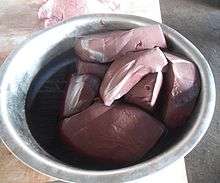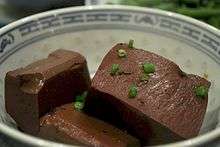Pig blood curd
 | |
| Place of origin | China |
|---|---|
| Main ingredients | Pig blood |
|
| |
Pig blood curd (Cantonese: 豬紅, Jyutping: zhu hong, Mandarin: 血豆腐, Pinyin: xuě dòufǔ), also known as “blood tofu” or “blood pudding”, is a popular Cantonese delicacy in Hong Kong and Southern China. It is commonly served with carbohydrates, such as noodles and congee.
Background
Pig blood curd originates from blood rice pudding (米血糕) in the 20th century in Southern China. Blood rice pudding is a pastry made from blood and rice grains. In Southern China, rice is the main ingredient of Chinese cuisine, the two common methods to cook rice is by steaming and boiling. Duck meat is a source of supplement (補劑), however, because of the poor living conditions in the past, poultries were only offered as sacrifices in Chinese festivals. In order to get nourishment from the ducks, the thrifty farmers saved the blood and steamed it with rice, and served with sauce. Later, blood rice pudding was spread to neighboring towns and villages, and people named it duck blood pudding (鴨血糕). However, due to the high-rising price of duck, and the chicken blood unable to coagulate to the form of pudding, duck blood was replaced by pig blood, resulting the birth of pig blood curd.[1]
Preparation

Pig blood curd is basically solidified pig’s blood. Fresh blood of the animal is coagulated by being left static inside a clean container for around 10 minutes. The blood cube is to be cut into smaller pieces, then heated in a pot with medium heat with adequate amount of water. During the heating process, salt is added to solidify the blood cubes and occasional stirring is required to prevent boiling of water. After 30 minutes, pig blood curd is ready to be served. Note that pig blood curds sold in markets should contain small air holes.[2]
Characteristics and variations
Pig blood curd is soft and smooth, as well as slightly chewy. It can be eaten by itself, or served in boiled soup, hot pot, or even made as a snack on a stick.[3]
Pig’s blood can also be made into a variety of dishes: In China, there are recipes like “Pig blood curd congee” (豬血粥), which is pig blood curd in congee, and “Maoxuewang” (毛血旺), a Sichuan dish served with pig blood curd, part of the cow's stomach, luncheon meat, eel, some form of intestine, and bean sprouts in Sichuan style spicy soup.[4] In Taiwan, pig’s blood is made into a famous street snack called “Pig's blood cake” (豬血糕), which is a mixture of pig’s blood, fried or steamed sticky rice, and peanut flour served on a stick.[5]
Pig’s blood is also made into food by many western countries. For example, in Britain, black pudding (Blood sausage) is made from pig’s blood and a high proportion of oatmeal.[6]
Nutrition
Pig's blood curd is rich in riboflavin, vitamin C, protein, iron, phosphorus, calcium, niacin and other minerals. Moreover, it is easy for body to digest and absorb. It also contains a certain amount of lecithin and can curb the harmful effects of low density cholesterol.
Excessive consumption may cause iron poisoning. It might affect the absorption of other minerals. Therefore, it is suggested to eat pig blood no more than twice in a week. Also, it should not be consumed with soya bean or kelp, they may result in indigestion and constipation respectively.
External links
| Wikimedia Commons has media related to Pig blood curd. |
References
- ↑ Taiwan food culture-Zhuxie Gao. Ministry of Foreign Affairs, Republic of China (Taiwan). Retrieved (23.03.2014)
- ↑ 致癌凝膠製假豬紅 蘋果日報. Retrieved (23.03.2014)
- ↑ Blood tofu: bloody delicious? Travel, China.org.cn. Retrieved (23.03.2014)
- ↑ 毛血旺的做法 美食杰. Retrieved (23.03.2014)
- ↑ Street Food From Taiwan: Pig’s Blood Cake Nicholas Chen, Seriouseats. Retrieved (23.03.2014)
- ↑ Tradition Black Pudding Guise Bule, The English Breakfast Society. Retrieved (23.03.2014)